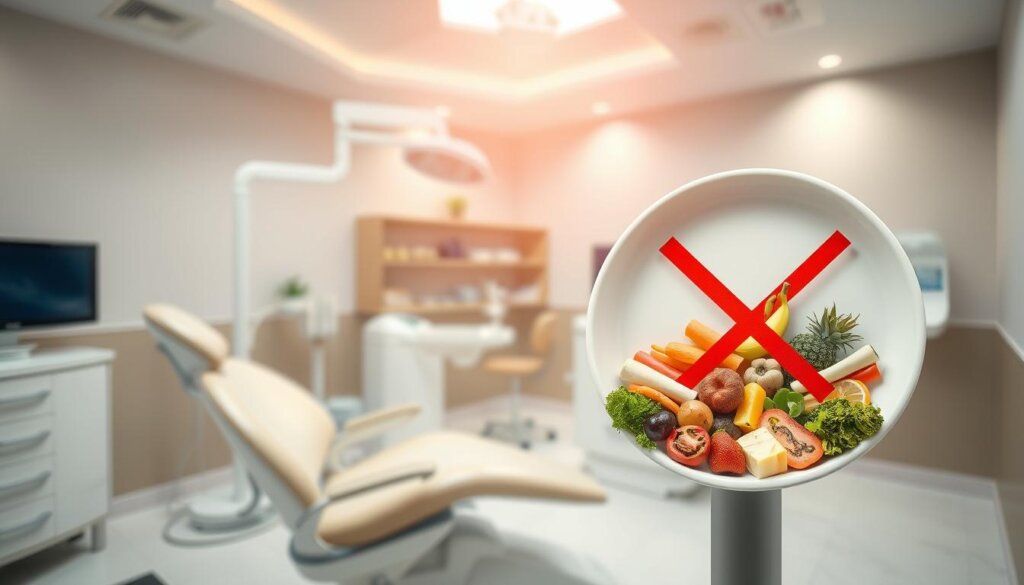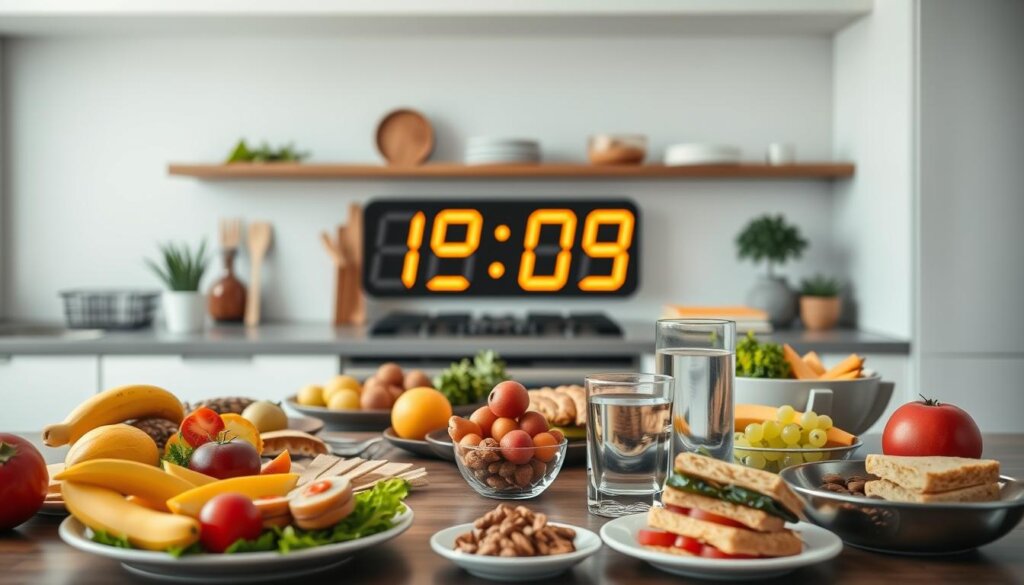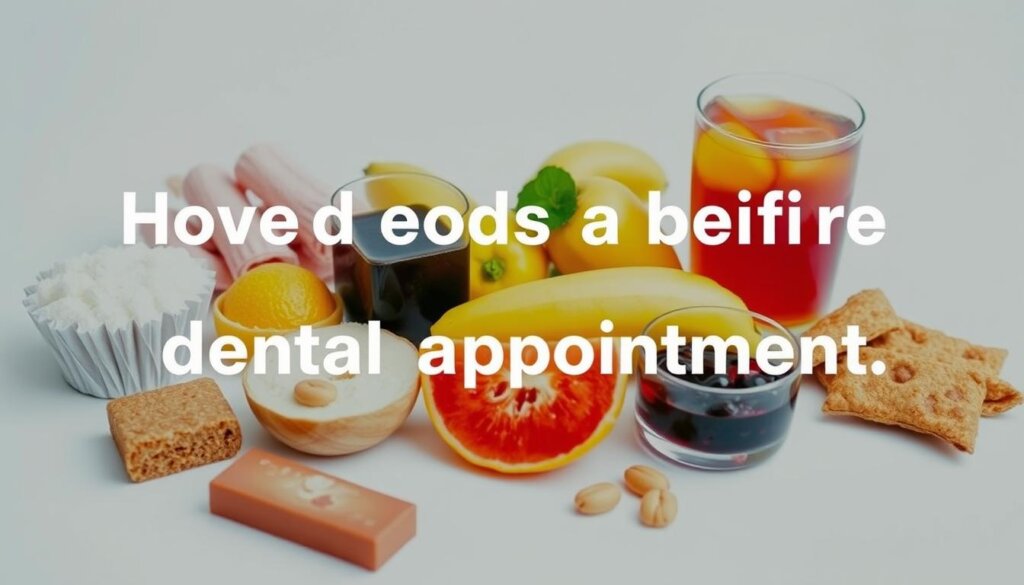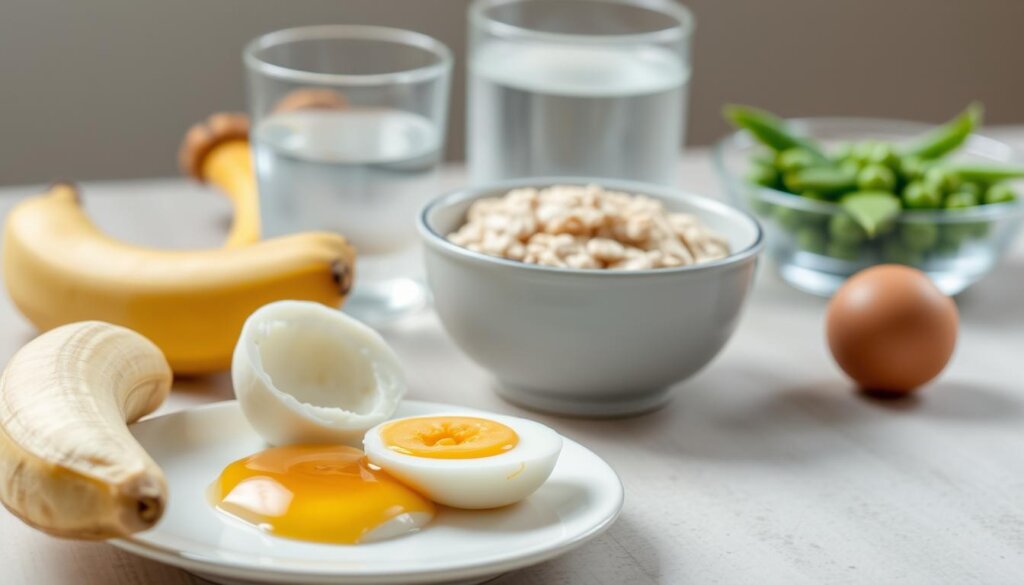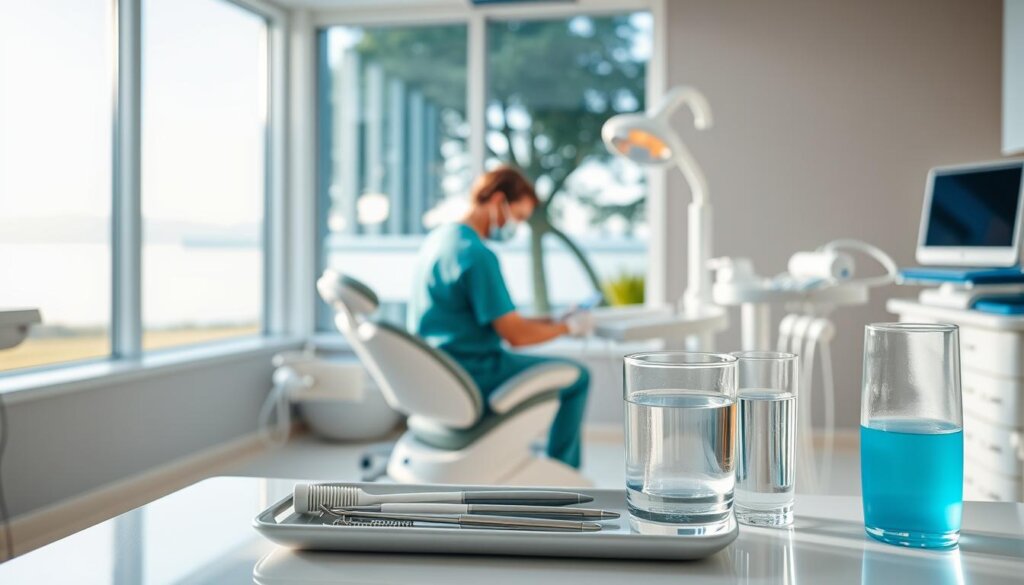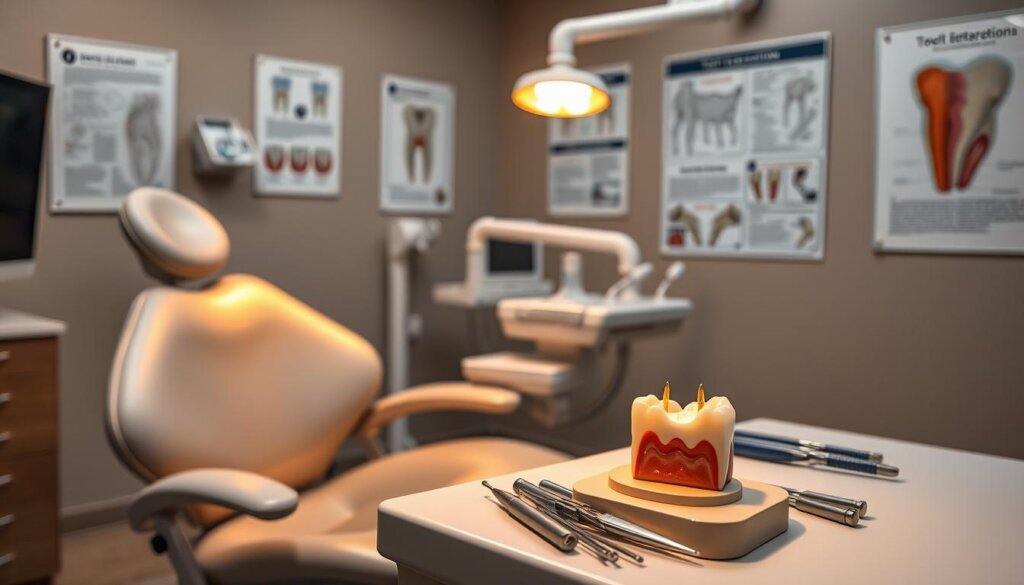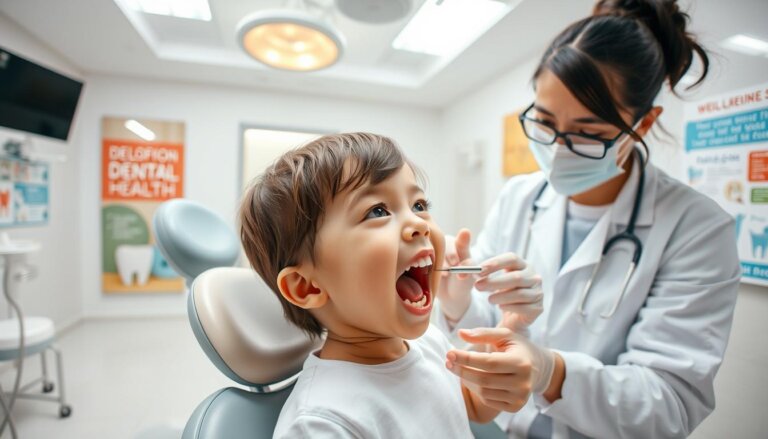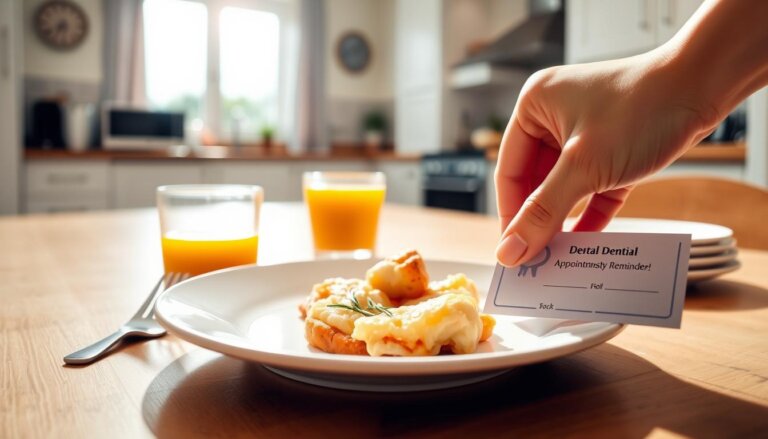Can I Eat Before My Dental Appointment?
Have you ever thought about how the snack you eat before your dentist visit can impact it? This question is key to daily oral care. Yet, many still ponder whether to eat before going to the dentist or to skip meals entirely.
Eating a light meal 1–2 hours before your appointment is usually okay and can even be helpful. Places like Preferred Dental in Ellicott City and Dental Co. of Knoxville suggest that eating before, followed by brushing and flossing, helps with both clear exams and maintaining steady blood sugar levels. But remember, not all dental visits are the same. For deeper procedures like sedation or extractions, your dentist may have specific guidelines about eating, so always check first.
This guide will take you through the do’s and don’ts of eating before dental visits. It covers the best timing, what foods to choose, how anesthesia fits into the picture, considerations for kids, and common myths. By the end, you’ll know exactly whether to eat or fast before your dental appointment, based on the type of procedure you’re getting.
Key Takeaways
- Most cleanings don’t need fasting; eating a small meal beforehand is usually best.
- Always follow your dentist’s advice about eating, especially if you’re having sedation or extractions.
- Brushing and flossing after eating helps keep your mouth clean for the exam.
- Steer clear of foods that stick, smell, or can dye your teeth like popcorn, garlic, and coffee before your appointment.
- It’s a good idea to ask your dentist directly about eating before your specific treatment.
- For procedures requiring sedation, double-check if you should fast and for how long.
Understanding the Importance of Dental Appointments
Regular dentist visits stop small problems from getting worse. They also get patients ready with food rules from their dentist. Plus, they give tips on what to eat before your visit. Planning ahead can make visits less stressful and keep your teeth healthy.
Regular Dental Checkups and Their Benefits
At these checkups, dentists can spot cavities, gum disease, and worn enamel early. Cleanings get rid of plaque and tartar that you might miss at home. This helps stop gum bleeding and makes your breath fresher.
Getting ready is key. Clean your teeth before your visit to get rid of bacteria and make your checkup quicker. Dental Co. of Knoxville highlights this. They talk about the importance of dentist’s food rules and advice for a smoother visit.
- Focus on prevention to avoid serious treatments.
- Keep records to decide when you need to come back.
- Get custom tips to improve brushing, flossing, and fluoride use.
What to Expect During Your Visit
A usual visit includes checking your health history, examining your gums, and a professional teeth cleaning. You might also get x-rays to check your teeth and bones more closely.
The dental team will go over what they find and give advice for after your visit. Preferred Dental says you can eat after a cleaning, but wait 30 minutes if you get fluoride treatment. They also match food advice to your needs to prevent discomfort during your visit.
- Checking your oral health and looking at any risks.
- Removing plaque and tartar to keep your teeth clean.
- Extra tests if needed, with time for any questions.
Timing: When Should You Eat?
When you eat matters for comfort, cleanliness, and focus during dental care. Patients often wonder what to eat before seeing the dentist. The key is eating a small, balanced meal at the right time.
This helps control saliva, keeps your blood sugar stable, and allows for clear communication. Preferred Dental suggests eating 1–2 hours before routine visits. It keeps your mouth fresh after a short digestive break.
Trying to schedule your appointment earlier in the day helps too. It prevents eating snacks before your exam and helps your mouth stay clean.
Recommended Eating Times Before Appointments
Eating a light breakfast like yogurt, eggs, or oatmeal is good for morning visits. It keeps your glucose levels steady and helps you stay calm. This eating plan before the dentist reduces the chance of reflux and dry mouth.
If your appointment is in the afternoon, eat something small two hours before. Then, brush or rinse your mouth. Dental Co. of Knoxville suggests avoiding coffee and sweets before coming. This helps prevent stains, sticky residue, and bad breath.
Guidelines for Same-Day Appointments
If you get a last-minute appointment, have a quick, light snack. Brush or rinse afterward to clean your mouth. If you’re not sure what to eat, call your dentist’s office for advice.
Check if you should fast before certain procedures like sedation. Some treatments might require not eating for hours. But for regular check-ups, a small meal and water are often fine. Just confirm with your dentist beforehand.
Effects of Food on Dental Procedures
Eating a light meal can help keep your blood sugar steady. This reduces feeling nervous during your visit. We suggest soft foods that won’t leave behind residues. These suggestions help keep your mouth clear for dental checks.
How Food Impacts Local Anesthesia
Eating a small snack before your appointment can help keep you from feeling dizzy. Big meals with lots of fat can slow digestion and lead to discomfort during your treatment. Choosing a light meal with carbs and protein keeps your energy up without overloading your stomach.
We recommend eating yogurt with oats or scrambled eggs with toast before visiting the dentist. These options are easy on your stomach and won’t mess with your saliva or breathing. They’re also odor-neutral and easy to digest.
Food and Oral Assessments
Foods that are sticky, hard, or colorful can hide dental problems. Drinks like coffee and tea might temporarily change tooth color, making it hard to see issues. Cleaning your teeth well after eating helps your dentist check your teeth closely.
It’s best to eat foods that don’t stick to your teeth before an appointment. These foods make it easier for the dentist to see and record any issues. Soft, mild foods without strong colors are your best choice for a pre-dentist meal.
| Pre-Visit Choice | Why It Helps | Assessment Impact | Clinical Tip |
|---|---|---|---|
| Plain Greek yogurt with berries | Balanced protein and carbs | Minimal residue; easy rinse | Brush and floss to remove seeds |
| Scrambled eggs and whole-grain toast | Stable energy, low odor | Does not stain; low debris | Drink water to clear crumbs |
| Oatmeal with banana | Slow-release carbs | Soft texture, gentle on gums | Rinse to remove film |
| Apple slices with peanut butter (thin layer) | Fiber and satiety | Potential sticking between teeth | Floss interproximally before visit |
| Water or unsweetened herbal tea | Hydration aids saliva flow | No staining; clears particles | Avoid dark brews to prevent tint |
Types of Food to Avoid Before Your Appointment
What you eat before seeing the dentist affects your comfort and the visit’s success. Avoid certain foods to keep your teeth clean and your visit smooth.
Sugary Snacks: Why They’re a No-Go
Sugar feeds plaque, making it harder to clean your teeth. Eating candy or cereal before an appointment can also make your teeth more sensitive.
Also, avoid snacks like caramel and popcorn that can stick to your teeth. And steer clear of drinks like coffee or cola that can stain your teeth and hide bad breath.
Onions and garlic can make your breath smell bad. Avoiding energy drinks and sodas beforehand also helps. This is because they can mess with the cleaning process.
Acidic Foods and Their Effects
Eating acidic foods like citrus or drinking sports drinks can make your enamel weak. This might make cleaning your teeth more painful, especially if your gums have receded.
Acidic snacks mixed with sugar, like sour candies, are even worse. They attack your teeth in two ways. So, it’s best to avoid them before dental appointments.
If you’re hungry, choose something mild. Very hot or cold foods can make your teeth hurt. Choosing the right food helps avoid plaque and discomfort during your visit.
- Avoid before arrival: candy, pastries, flavored gummies, popcorn, seeds, nuts
- Limit: coffee, tea, cola, energy drinks, garlic- or onion-heavy foods
- Defer: citrus fruits, vinegar dressings, carbonated and sports drinks
Foods You Can Safely Eat
Choosing what to eat before a dentist appointment can be easy. Go for meals that are light and leave little behind in your mouth. These meals help you stay energized and don’t mess with your dental check-up.
Light Meals: What’s Recommended?
Preferred Dental suggests foods like scrambled eggs, yogurt, bananas, oatmeal, and apples. These are soft, simple to chew, and won’t get stuck in your teeth.
Try avocado toast with a boiled egg for more fullness. This combo keeps your blood sugar steady, calming nerves before the visit. For a good balance, mix protein with complex carbs to stay alert during your exam.
Dental Co. of Knoxville says a light meal is fine before a cleaning. Just brush and floss after eating to reduce bacteria and tidy up for the check-up.
Hydration: Importance of Drinking Water
Water is your best bet for a drink, before and after the dentist. It keeps your mouth comfortable and washes away bits of food. This is crucial before getting your teeth polished and scaled.
Include water with your snack or breakfast for better pre-visit prep. Preferred Dental also recommends drinking water after your visit to help clean naturally. Rinse, brush, and floss before leaving home to ensure a smooth dental appointment.
Preparing for Cleaning Procedures
Getting ready for a cleaning begins with making smart decisions beforehand. It helps if you eat certain foods before your dental visit to comfort your mouth and reduce plaque. Our team likes easy steps that keep your energy up and your teeth and gums ready.
Optimal Food Choices for Teeth Cleaning
Dental Co. of Knoxville suggests eating a light meal that’s easy on your stomach and teeth. Pick soft foods that won’t stick or get trapped. This advice follows what’s best to eat before a dental visit, focusing on feeling good and staying clean.
- Choose: Scrambled eggs, plain yogurt, oatmeal, ripe banana, whole-grain toast, baked sweet potato.
- Avoid: Sticky candies, granola clusters, popcorn, garlic-heavy dishes, and dark drinks like coffee or cola.
Preferred Dental recommends brushing and flossing after your meal to clean away bits of food and plaque. Stay away from very hot or cold foods and ones that could stain your teeth. These steps help your hygienist begin with a clean slate.
Timing Your Last Meal Before Cleaning
Preferred Dental advises eating 1–2 hours before your appointment. This timing helps digestion, lowers the chance of acid reflux, and keeps your mouth fresh. It gives you enough time for a final clean-up without rushing.
- Eat a light, balanced meal 60–120 minutes before the appointment.
- Rinse, floss, and brush to remove residue and neutralize breath odors.
- Skip sticky, crunchy, and odorous items that linger in the mouth.
- If fluoride is applied after cleaning, wait about 30 minutes before eating or drinking.
These guidelines combine what to eat with when to eat before a dentist visit. They ensure you and your dentist have a comfortable and clear starting point.
Special Considerations for Tooth Extractions
When pulling a tooth, the plan is different from just a cleaning. Our advice focuses on being safe, keeping the wound safe, and choosing the best time. Eating right before dental work and following specific food advice can help with feeling sick, lowering the chance of bleeding, and easing pain after.
Pre-Procedure Dietary Restrictions
If you’re getting sedation or going fully under, dentists usually say not to eat to keep your airway safe. Always check with your dentist or surgeon for specific instructions, as it can change based on your health and the medicine used.
For just local anesthesia, eating something light a few hours before is okay. It keeps your blood sugar up without risking food going down the wrong way. Picking foods that are easy on the stomach and avoiding hard or seedy foods helps keep your energy stable and cuts down on feeling light-headed.
- Keep it simple: Think yogurt, oatmeal, or a banana with nut butter.
- Skip stimulants: Cut back on coffee and energy drinks to stay hydrated.
- Hydrate with water: Drink small amounts to keep your mouth from drying out without making your stomach full.
Take your dentist’s advice on what and when to eat based on the dental work and anesthesia you’ll have.
Post-Extraction Meal Guidance
Once a tooth is out, you need the blood clot to stay put. Dentists often say to wait a bit before eating to keep the area safe. Begin with foods that are soft and not too hot or cold, and eat using the other side of your mouth.
Good food choices include smoothies, mashed potatoes, scrambled eggs, and brothy soups. Don’t use straws since the sucking action can mess up the clot. Drinking water is best for keeping the spot clean and healing well, while sweet or fizzy drinks might bother the area.
- Day 1–2: Stick to soft foods, avoiding seeds, chips, and spicy stuff.
- Temperature check: Warm foods are gentler on new wounds.
- Pacing: Eating smaller meals more often is easier on the healing spot.
Listening to your dentist about when to eat, which side to chew on, and how to clean your mouth can help you avoid problems. By eating carefully before and after your dental work and following your dentist’s food advice, you can stay comfortable while your mouth heals.
Impact of Eating on Dental X-Rays
Dental X-rays need careful positioning and a clean mouth. Eating light foods and cleaning your mouth well before your dentist appointment helps a lot. Even though you mostly don’t need to fast for routine X-rays, doing so can make the process smoother.
Practical tip: Brush, floss, and rinse your mouth with water before the X-ray. This helps get a clearer image and lessens discomfort during the procedure.
Why You Might Need to Fast for X-Rays
Sometimes, the dentist might ask you to fast before an X-ray. This is usually when it involves sedation or a lengthy treatment. The fasting here is more about staying safe under anesthesia rather than the X-ray itself. Always double-check with your clinic if fasting is needed, especially if you’re getting sedation.
- Routine bitewings or panoramic images: usually no fasting.
- Sedation-supported procedures: follow specific dietary restrictions.
- Comfort-focused care: a light meal several hours prior is often acceptable.
Foods that Can Affect Image Quality
Certain foods can mess with the quality of dental X-rays. Opt for simple foods that don’t leave behind residues. Also, avoid foods with strong colors that could distort the images.
| Food/Drink | Potential Issue During X-Rays | Preferred Alternative | Timing Guidance |
|---|---|---|---|
| Sticky candies | Adheres to enamel and sensors; increases debris | Plain yogurt or scrambled eggs | Finish 2–3 hours before, then brush and floss |
| Seeds and nuts | Fragments lodge interproximally; discomfort on bite tabs | Oatmeal or a banana | Allow 2 hours; rinse thoroughly afterward |
| Greasy foods | Lingering mouthfeel; can heighten gag reflex | Whole-grain toast with hummus | Limit portion; rinse with water |
| Coffee or black tea | Temporary staining distracts during assessment | Water or milk | Avoid within 1–2 hours pre-visit |
| Carbonated drinks | Gas and acidity may increase oral sensitivity | Still water | Skip day-of; hydrate with water |
| Spicy foods | Irritates mucosa; harder to tolerate sensor edges | Soft, mild soup | Choose mild options if eating near appointment |
To make your X-ray clearer and more comfortable, follow these eating tips. If you’re unsure about fasting before your dentist appointment, just call your clinic. They can tell you if you need to adjust your meals for the day.
Managing Anxiety About Eating Before Appointments
It all starts with clear advice. Knowing what to eat before dental visits can help. It lets patients choose between a small meal or not eating, depending on the need. Planning helps reduce stress and discomfort when there’s a need to fast.
How to Feel Comfortable Without Eating
Some dental work needs an empty stomach. Try scheduling your visit early. This way, you’re not fasting for too long. Drink water if it’s okay, and a light clean of your teeth can make you feel ready.
Avoid too much coffee to keep nerves calm. If you’re unsure, calling the dental office to check their rules can help. Knowing what’s okay to eat or drink can prevent worry and help you stay calm.
- Set an alarm the night before to stay on track.
- Prepare a post-visit snack at home for quick recovery.
- Wear comfortable layers to support relaxed breathing.
Calming Techniques Before Your Visit
Try short activities that help you relax. A quick walk, slow breathing through your nose, and gently tensing then relaxing your muscles can help calm your mind. This is helpful when you can’t eat before dental treatment.
Combine these activities with a good plan. Arriving a bit early, having questions ready, and discussing the day’s plan with the clinic can help you stay calm. Being prepared is key, especially when you have to fast.
| Situation | What to Do | Why It Helps | Nutrition Note |
|---|---|---|---|
| Fasting for sedation | Book a morning slot; confirm rules with the office | Reduces hunger-related stress and uncertainty | Water only if allowed; plan a soft meal for after |
| Routine cleaning with nerves | Use paced breathing (4-in/6-out) for 2–3 minutes | Lowers sympathetic drive and muscle tension | Light snack earlier if permitted; avoid excess caffeine |
| Unclear instructions | Call to verify eating before dental treatment rules | Improves compliance and confidence | Aligns intake with dietary recommendations for dental visits |
Children and Eating Before Dental Visits
Kids do best when things are calm and predictable. Good meal ideas before the dentist help keep their energy and mood stable. Clear guidelines on what to eat help them cooperate better. Try to schedule visits when your child is most awake. Also, leave plenty of time so you’re not in a hurry.
A light, non-sticky meal 1–2 hours before the visit helps prevent hunger and grumpiness. It’s important for the child to brush and floss after eating. This helps remove plaque and bits of food. Drinking water before the appointment is good. It helps clean away colors and sugars from the teeth.
Special Guidelines for Kids’ Appointments
- Choose foods that are soft, mild, and low in acid, following age-appropriate dental food guidelines.
- Stay away from sugary treats, sticky candy, bright colors, popcorn, seeds, and extreme temperatures that could make teeth sensitive during cleaning.
- Check with the dentist about fasting rules if sedation or an extraction is planned. Adjust meals before the dentist visit as needed.
- Encourage drinking water before coming; avoid fizzy drinks and fruit juices that leave a coating on teeth.
- Bring a small snack for after, especially if the appointment is long.
Healthy Snacks for Pediatric Patients
- Plain yogurt with mashed bananas or soft berries for energy and easy digestion.
- Oatmeal or overnight oats with cinnamon; avoid sticky things like caramel chips.
- Scrambled eggs or a small turkey-and-cheese roll-up for protein that doesn’t leave a mess.
- Whole-wheat toast with a thin layer of peanut butter; remember to drink water and brush teeth afterward.
- Apple slices or cucumber rounds for those who can chew easily; pick softer fruits for little ones.
For kids needing food after a procedure, choose soft, nutritious options like yogurt, oatmeal, or scrambled eggs. Make sure these snacks fit the dental food guidelines. Also, think about the child’s age, the type of procedure, and how comfortable they are.
Understanding Dental Anesthesia Protocols
Eating right before dental work depends on the kind of anesthesia and your health. Many wonder if they should eat or fast before seeing the dentist. This choice varies based on the procedure and personal medical concerns.
Clinics give specific advice after looking at your health, meds, and risk factors. They usually suggest drinking water unless told not to for sedation. Avoiding caffeine can also lower anxiety and prevent high blood pressure.
Types of Anesthesia Used in Dentistry
Local anesthesia numbs the area being worked on. It’s commonly used for fillings, crowns, and gum treatment. You stay awake but feel no pain there.
For those feeling anxious, mild or moderate sedation can help. This includes laughing gas or pills that make you less aware but still awake.
Deep sedation or going fully to sleep needs an expert to watch over you. This ensures you breathe properly and stay safe during the procedure.
- Local anesthesia: Numbs quickly, works well for simple procedures.
- Nitrous oxide: You breathe it in, and it wears off fast.
- Oral/IV sedation: Ranges from slight to deep calmness, depending on how it’s given.
- General anesthesia: You’re fully asleep, with close monitoring.
Eating Guidelines Based on Anesthesia Type
If you wonder about eating before dental visits, it depends on the anesthesia. With local anesthesia, a small meal is fine to keep your blood sugar stable. Just be careful eating later so you don’t bite yourself.
With sedation, there’s a risk of inhaling food into your lungs, so fasting is important. You might be allowed some water before the procedure. Avoid greasy food since it digests slowly and can affect sedation.
- Cut down caffeine on the day of your treatment to stay calm and keep blood pressure normal.
- Stick to water for staying hydrated unless you’re told not to drink anything.
- After your visit, choose a soft, healthy snack if your mouth still feels numb.
| Anesthesia Type | Consciousness/Reflexes | Pre‑Procedure Eating | Hydration | Notes for Safety |
|---|---|---|---|---|
| Local Anesthesia | Awake; reflexes intact | Light meal 2–3 hours before; avoid heavy, greasy foods | Water allowed | Afterward, chew carefully to prevent lip or cheek injury |
| Nitrous Oxide (Minimal Sedation) | Awake; relaxed | Small snack only; avoid large meals to reduce nausea | Water allowed unless instructed otherwise | Reduce caffeine; report recent illness or congestion |
| Oral/IV Moderate Sedation | Drowsy; reflexes may be blunted | Follow fasting window set by the office (often 6–8 hours for solids) | Clear liquids only as directed; then stop per timeline | Escort required; no driving until fully recovered |
| Deep Sedation/General Anesthesia | Unconscious; airway managed | Strict fasting for solids per anesthesia plan (commonly 8 hours) | Clear liquids permitted up to a cut‑off time if approved | Adhere to all pre‑op instructions; disclose all medications |
In short, your anesthesia type guides whether you should fast before the dentist. Light meals are usually okay for local treatments. Any type of sedation means you need clear instructions from your dentist.
Consult Your Dentist: Best Practices
Talking clearly and on time with your dentist makes general tips suit your health and medication needs. It helps tailor food guidelines so your visit is both smooth and safe.
Picking the right time for your visit is important. You should eat a light meal before, if you can, and leave some extra time just in case. This way, what you eat before a dental visit fits the clinic’s schedule.
Why Communication is Key
Everyone’s health and mouth are unique. Different procedures need different food rules. A call before you go gets you the right food guidelines, considering fasting, fluoride, and what to eat after.
Asking questions early helps a lot. It can stop you from feeling sick, lower the risk of problems, and make sure pictures of your teeth are clear. It also tells you when it’s safe to eat again.
Questions to Ask About Eating Before Your Appointment
- Do I need to fast for my procedure, and for how many hours?
- When should I stop food and liquids, including water, coffee, or supplements?
- Which foods or drinks should I avoid on the day of treatment?
- After my visit, when can I eat, and what textures are best—soft, cool, or room-temperature?
- How do fluoride, whitening, fillings, or extractions change the timing of my first meal?
- Should I modify medications or nutrition if I have diabetes, GERD, or pregnancy considerations?
Use these questions to make eating guidelines fit your treatment plan. This gives you a checklist you can trust, from not eating before to the first meal after your visit.
Myths and Facts About Eating Before Dental Visits
Patients often wonder, “Can I eat before my dental visit?” Giving clear advice helps manage expectations and ease worry. Our team checks what experts say to tell myth from fact. We explain what you can eat before seeing the dentist in simple terms.
Common Misconceptions
- “You must always fast.” For regular check-ups and cleanings, you usually don’t need to fast. Eating something light and non-greasy can keep your blood sugar stable and make you comfortable.
- “Coffee is harmless before cleanings.” Coffee, tea, and cola can stain your teeth and affect the cleaning. This makes it harder for dentists to check your tooth color.
- “All foods are fine pre-visit.” Foods that are sticky, crunchy, smelly, colorful, very hot, or cold can be problematic. They might leave debris, stain teeth, make your teeth sensitive, or cause bad breath.
- “Post-visit eating is always unrestricted.” What you can eat after depends on the procedure. Treatments like fluoride, fillings, or extractions all have specific waiting periods before you can eat normally.
These myths can affect how comfortable and accurate your dental visit is. The answer to “Can I eat before my dental visit?” depends on what you’re going in for and any dietary rules from your dentist.
Facts to Consider Before Your Appointment
- Before most check-ups, you can have a small, balanced meal. Then, make sure to brush and floss well.
- Avoid food and drinks that stain right before your appointment. This means no coffee, black tea, red wine, sports drinks, or colored candy.
- Choosing foods and drinks that are gentle on your teeth is smart. For example, lukewarm water won’t shock your enamel.
- After certain treatments, what and when you can eat matters. For fluoride, wait a bit; for whitening, avoid colored foods for the day.
- Let your dentist know about any health issues or medications. This helps them guide you on what to eat before your visit.
Thinking ahead helps you create a simple plan before your dental visit. If you’re unsure about eating beforehand, check with your dentist. They will give you guidelines based on your specific needs.
| Scenario | Eat Before? | Smart Choices | Avoid | Post-Visit Timing |
|---|---|---|---|---|
| Routine exam/cleaning | Yes, light meal | Oatmeal, banana, plain yogurt, scrambled eggs | Coffee, dyed drinks, garlic/onion-heavy foods | Resume normal diet after cleaning unless advised |
| X-rays only | Usually yes | Water, simple carbs, gentle proteins | Sticky candies, crunchy chips | Immediate unless otherwise directed |
| Fluoride treatment | Yes, light | Soft, non-acidic foods | Acidic sodas, citrus, hard snacks | Wait ~30 minutes before eating or drinking |
| Local anesthesia with filling | Small meal if instructed | Easy-to-digest foods; hydrate | Very hot foods, chewing on numb side | Wait until numbness fades; follow specific guidance |
| Extraction | Follow instructions | Pre-visit light meal if allowed; post-visit soft foods | Straws, hot liquids, spicy or crunchy foods | Several hours; progress to soft diet as advised |
| Whitening | Light, non-pigmented meal | “White diet”: rice, chicken, milk, plain pasta | Coffee, berries, red sauces, cola | Avoid dark/acidic items for the day |
Plan your visit with these tips in mind. Ask specific questions to match your choices with your dental procedure. If you’re not sure about eating before your dental appointment, listen to the advice your dentist gives you when you book or confirm your visit.
Conclusion: Making Informed Choices
Planning your dental visit is easy and based on science. Eat a light, balanced meal 1–2 hours before to keep your energy up. Brush and floss after eating to make sure your mouth is clean. Drinking water is also a good idea. These tips for what to eat and drink before dental procedures help keep your mouth clean, reduce smells, and keep you comfortable.
Summary of Key Points
Avoid sticky, crunchy, highly colored, or extreme temperature foods. They can bother your mouth and leave behind particles. Stick to foods like yogurt, scrambled eggs, oatmeal, bananas, or soft whole-grain toast before dentist visits. If you’re going in for something like sedation or extractions, be sure to follow your dental team’s instructions on not eating beforehand.
After your appointment, the timing of when you eat is important. Wait a bit after fluoride treatments, and even longer after fillings or extractions. Choose soft foods as recommended, and stay away from anything that could stain after a whitening procedure.
Final Thoughts on Eating Before Your Dental Appointments
Being prepared helps everything go smoother. The right timing, staying hydrated, and picking the best foods can make your dental visit better. If you’re unsure about what to do, especially with anesthesia or surgery, just call your dentist’s office. They can give you clear instructions. With the right advice and meal choices before your appointment, you’ll be ready, your dentist can work effectively, and your recovery will be on the right path.

